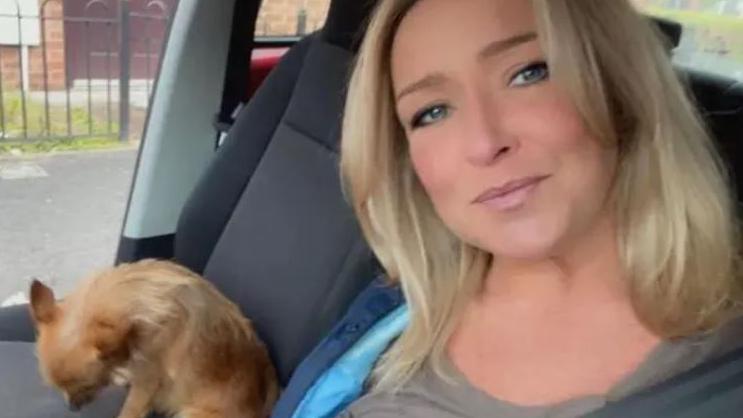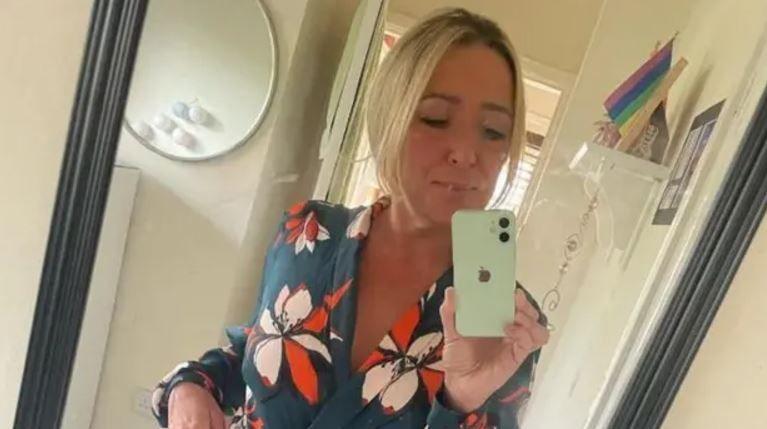Police mistakenly refused to divulge abuse history

Teresa McMahon was news editor at Granada Reports
- Published
A journalist was "mistakenly" told by police weeks before her death that she was not entitled to know if her former partner had any history of domestic abuse, an inquest has heard.
Granada Reports news editor Teresa McMahon was found dead at her flat in Salford in August 2021, not long after she had reported to Greater Manchester Police (GMP) that she had had her fingers and potentially one of her ribs broken.
The 43-year-old's ex-partner, Robert Chalmers, gave evidence by video-link from Bolton after he was arrested for failing to appear at her inquest in London. He denied either hurting her physically or trying to control her.
Coroner Mary Hassell concluded Ms McMahon had taken her own life and that "no other person forced her to do that".
'Clare's Law'
She said: "I don't have any evidence that any other person physically caused Teresa's death."
The court heard Ms McMahon asked GMP on 12 July 2021 to disclose information about any history of violence or abuse from Mr Chalmers.
Giving evidence at the inquest, Det Insp Charlotte Poole said a junior GMP officer had "mistakenly" told Ms McMahon nine days later that she was not entitled to this information under Clare's Law because she was not currently in a relationship with him.
Officers unsuccessfully tried to get in touch with Ms McMahon the next day and again on 29 July to tell her she might be entitled to receive the information.
Det Insp Poole also told the inquest that during the 21 July police visit, Ms McMahon had made a "complaint of broken fingers and a potentially broken rib but had not sought medical attention for those injuries" and did not wish to assist in a prosecution of Mr Chalmers.
She said: "It's not unusual for domestic abuse victims to not want to assist in a prosecution once they've made that report."
Ms Poole revealed Mr Chalmers had been named in "three logs" of domestic abuse reports over an 11-year-period.
These were not necessarily convictions - they could have been accusations or intelligence reports.
Mr Chalmers accepted his relationship with Ms McMahon had been volatile, but said he did not hurt her physically, nor coerce or control her.
Asked by the coroner if he thought unhappiness with their relationship was a factor in her death, Mr Chalmers replied: "No."

Ms McMahon was "driven" and "very generous", her father said
Ms Hassell asked Det Insp Poole if GMP had considered the possibility Ms McMahon might have killed herself due to being subjected to coercive control.
She replied "there was nothing to indicate she was".
Det Ch Insp Gareth Humphreys told the inquest "no defence injuries" had been found on Ms McMahon's body.
He said a journal written by her, seen by police, referred to "reasons why she wanted to die".
Dr Muhammad Bashir, who carried out Ms McMahon's post-mortem examination, told the inquest there was no indication anyone else had been involved in her death.
Det Con Max Baimak said in a statement, read out to the inquest, there were "no malicious or threatening communications between Teresa and Robert".
It added Ms McMahon had messaged Mr Chalmers on 2 August, writing "I wish I was dead".
In another message she wrote: "I've got nothing. I've never felt so worthless," with Mr Chalmers later replying: "You have and do so much Teresa."
He also messaged "Hope you're OK Teresa" and "Let me know you're OK".
'Very generous'
Ms McMahon's father, Bernard, said he thought her death was the "tragic combination of being in a bad relationship, drinking too much alcohol and suffering depression".
In a written statement read out to court, he said: "There was screaming, shouting and threats made between them both, but I don't believe there was any physical abuse or controlling behaviour."
He described his daughter as "driven" and "very generous".
Ms McMahon's aunt, Lorna McMahon, told the court her brother "was lying", adding he was "friends with Robert Chalmers".
Ms Hassell said while the inquest was "not a public inquiry into GMP", the police investigation into her death was "not perfect".
In a statement issued after the inquest, Assistant Chief Constable Steph Parker said GMP had "addressed concerns raised by the coroner around the benefit of scene photos in non-suspicious circumstances, and clearer retention periods for body-worn video".
If you have been affected by this story or would like support then you can find organisations which offer help and information at the BBC Action Line
Listen to the best of BBC Radio Manchester on Sounds and follow BBC Manchester on Facebook, external, X, external, and Instagram, external. You can also send story ideas to northwest.newsonline@bbc.co.uk, external and via Whatsapp to 0808 100 2230.
Get in touch
Do you have information you wish to share related to this story?